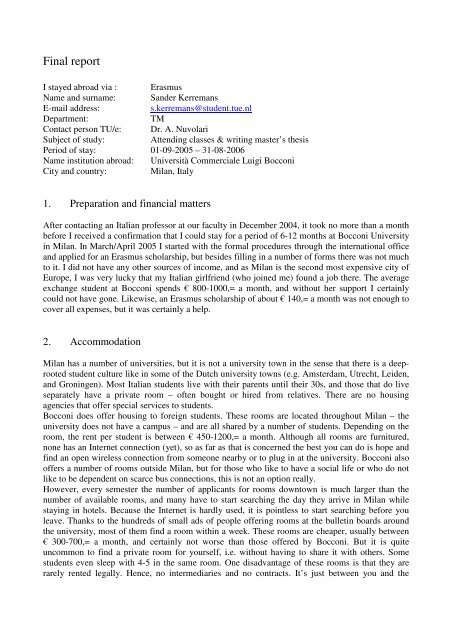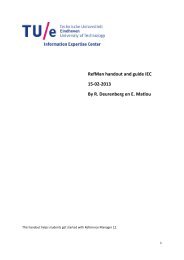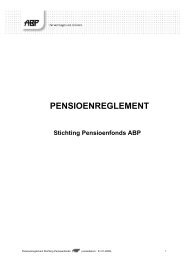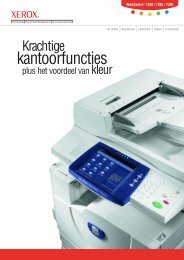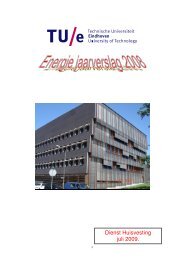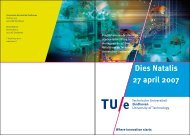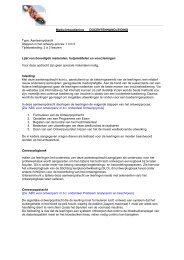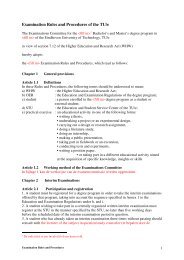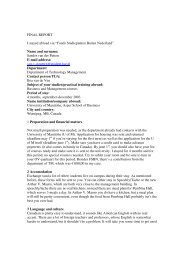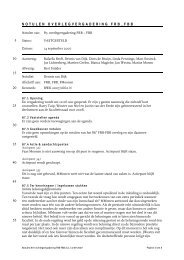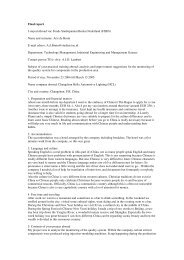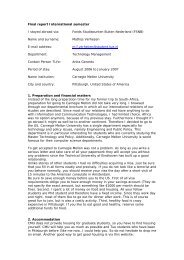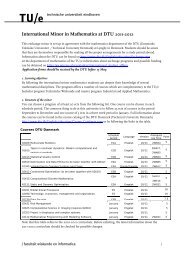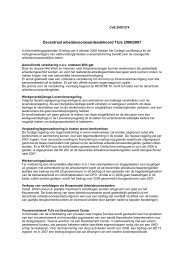Final report
Final report
Final report
Create successful ePaper yourself
Turn your PDF publications into a flip-book with our unique Google optimized e-Paper software.
<strong>Final</strong> <strong>report</strong><br />
I stayed abroad via : Erasmus<br />
Name and surname: Sander Kerremans<br />
E-mail address: s.kerremans@student.tue.nl<br />
Department: TM<br />
Contact person TU/e: Dr. A. Nuvolari<br />
Subject of study: Attending classes & writing master’s thesis<br />
Period of stay: 01-09-2005 – 31-08-2006<br />
Name institution abroad: Università Commerciale Luigi Bocconi<br />
City and country: Milan, Italy<br />
1. Preparation and financial matters<br />
After contacting an Italian professor at our faculty in December 2004, it took no more than a month<br />
before I received a confirmation that I could stay for a period of 6-12 months at Bocconi University<br />
in Milan. In March/April 2005 I started with the formal procedures through the international office<br />
and applied for an Erasmus scholarship, but besides filling in a number of forms there was not much<br />
to it. I did not have any other sources of income, and as Milan is the second most expensive city of<br />
Europe, I was very lucky that my Italian girlfriend (who joined me) found a job there. The average<br />
exchange student at Bocconi spends € 800-1000,= a month, and without her support I certainly<br />
could not have gone. Likewise, an Erasmus scholarship of about € 140,= a month was not enough to<br />
cover all expenses, but it was certainly a help.<br />
2. Accommodation<br />
Milan has a number of universities, but it is not a university town in the sense that there is a deeprooted<br />
student culture like in some of the Dutch university towns (e.g. Amsterdam, Utrecht, Leiden,<br />
and Groningen). Most Italian students live with their parents until their 30s, and those that do live<br />
separately have a private room – often bought or hired from relatives. There are no housing<br />
agencies that offer special services to students.<br />
Bocconi does offer housing to foreign students. These rooms are located throughout Milan – the<br />
university does not have a campus – and are all shared by a number of students. Depending on the<br />
room, the rent per student is between € 450-1200,= a month. Although all rooms are furnitured,<br />
none has an Internet connection (yet), so as far as that is concerned the best you can do is hope and<br />
find an open wireless connection from someone nearby or to plug in at the university. Bocconi also<br />
offers a number of rooms outside Milan, but for those who like to have a social life or who do not<br />
like to be dependent on scarce bus connections, this is not an option really.<br />
However, every semester the number of applicants for rooms downtown is much larger than the<br />
number of available rooms, and many have to start searching the day they arrive in Milan while<br />
staying in hotels. Because the Internet is hardly used, it is pointless to start searching before you<br />
leave. Thanks to the hundreds of small ads of people offering rooms at the bulletin boards around<br />
the university, most of them find a room within a week. These rooms are cheaper, usually between<br />
€ 300-700,= a month, and certainly not worse than those offered by Bocconi. But it is quite<br />
uncommon to find a private room for yourself, i.e. without having to share it with others. Some<br />
students even sleep with 4-5 in the same room. One disadvantage of these rooms is that they are<br />
rarely rented legally. Hence, no intermediaries and no contracts. It’s just between you and the
owner. If you stick to the rules, e.g. often there are no guests allowed after 11 p.m., you will have a<br />
pleasant stay; if you don’t, you might end up on the streets in the middle of the night.<br />
Because I went together with my girlfriend, we arranged an apartment through a housing agency.<br />
Although we found a room quite fast and right in the centre of Milan, this was the first and the last<br />
time we would ever hire such an agency. Their commission was two times a month’s rent, so we<br />
spent € 1600,= for their services, excluding contracting costs, etc. These prices are very common in<br />
a city like Milan, but you have the certainty of finding a place to stay and everything is taken care<br />
of. However, these services are unaffordable for the average exchange student. Moreover, rents of<br />
Milanese apartments are rarely lower than € 650,= a month – excluding water, electricity, gas, and<br />
service charges – and most apartments are only rented for at least one year (usually two times four<br />
years) with at least a six month’s notice. So I would advise exchange students to go for the other<br />
two alternatives of finding an accommodation.<br />
3. Language and culture<br />
The Italian language is quite difficult for non-Latin cultures, such as the Dutch or English. Because<br />
few Italians speak English, being able to speak some basic Italian is almost a necessity and helps<br />
avoiding miscommunication and misunderstanding. Before leaving to Italy, I already followed a<br />
one-year course at Dante in Eindhoven. There are also Italian courses at the university in<br />
Eindhoven, but I could not fit them into my schedules. Although the Dante courses cost about €<br />
120,= a year, the advantages are that there are many different levels, and they are given one evening<br />
a week by mostly native Italians. So upon arrival in Milan I was already able to have elementary<br />
conversations.<br />
Bocconi offers intensive, full time language courses at different levels specifically for exchange<br />
students for € 100,=. They start in the beginning of September and finish with an exam somewhere<br />
in the beginning of October when the regular classes start; of course, these courses are also given<br />
for exchange students starting in January/February. Upon arrival, everyone who wishes to follow<br />
these courses has to do an exam, of which the results determine your level. You don’t have to<br />
follow these courses, but I found them very good and very useful. Students are very motivated,<br />
because they are all there for the same reason. The teachers are professionals and they really try to<br />
get the most out of the group. Although attending Italian class for 6-8 hours a day, 5 days a week<br />
can be quite tiring, they are not obligatory. But those that do choose to attend them, cannot skip<br />
more than three classes or they will be excluded from the exam. Another advantage is that these<br />
courses bring about many friendships that are very useful for the rest of your stay. During the<br />
semester there is a follow up course, for two times two hours a week, for 10 weeks and cost another<br />
€ 100,=. I did not follow them because they were incompatible with my class schedule, but also<br />
these courses are of a high quality I heard from students who did.<br />
Of the regular courses, about half is given in English. Very few exchange students follow those<br />
given in Italian because of difficulties of the language, especially during group work, writing<br />
papers, or giving presentations.<br />
About the Italian culture there are too many things to mention. Most importantly, Italians have a<br />
totally different concept of time than the Dutch. Time is like something they own. Agendas and<br />
time schedules are rarely strictly followed. Moreover, they do many things at the same time. In<br />
group work with Italians it is no exception that they are doing many other, non-related things. For<br />
them, this is not rude, neither is having to let someone wait for an appointment; in their eyes,<br />
everyone has always something to do, so it doesn’t matter whether they are too late or do something<br />
else at the same time. They do seem less stressed, but in effect it takes them much more time to<br />
accomplish things. While in The Netherlands we do one thing at the time, Italians do many things at<br />
the same time so they continuously have to divide their attention. They do work hard, but in a way<br />
that is much less effective in my view. In daily life this manifests itself in long queues in many
situations. For example, I had to wait for four hours to get myself a season ticket for the public<br />
transport. Instead of getting angry, it is better and do as the Italians: expect this to happen anywhere,<br />
anytime, and prepare yourself for it. Leave in time if you have to go somewhere, and take a book<br />
with you.<br />
Other things are less relevant because exchange students stay only for a few months and are<br />
surrounded by many others; there is hardly any contact with Italians – unless you choose otherwise,<br />
of course. The most important thing that helped me was to learn and be patient and to recognize the<br />
differences without judging them. Some Italian ways of doing are superior, some are inferior, but I<br />
think that is not the point. To me, the most important thing was to learn from each other and to<br />
enjoy this invaluable experience. And after a one year stay in Italy, I got to appreciate my own<br />
country much better for the grass is not always greener on the other side.<br />
4. Free time and travelling<br />
The great thing about Milan is that it has an excellent public transport system and that its location is<br />
very central. The Alps are only half an hour away, there are 3 airports nearby, and there are fast and<br />
cheap railway connections with Mediterranean Sea, the Adriatic Sea, the lakes, and a large number<br />
of touristic Italian, Swiss, French, and Austrian towns. Popular destinations are Venice, Bologna,<br />
Florence, Rome, Nice, Turin, Genoa, Le Cinque Terre, Como, and Verona. During the weekends<br />
there is plenty of time to explore the region or even to go skiing. And the Erasmus Student Network<br />
organisation in Milan organizes many great activities at low cost. At the beginning of the semester,<br />
the working pressure is rather low and one can even consider leaving Milan during the week,<br />
especially in September when the weather is still great. But towards the end of the semester, the<br />
pressure is really high, not in the last place because the subjects are not geared to one another.<br />
I found it very well worth the money (only € 17,50 a month) to buy a season ticked the Milanese<br />
public transport. It allows you to take every tram, bus, or metro and takes you from one side to the<br />
city to the other in less than half an hour. Another great thing I found about Milan, was that it is also<br />
very cheap to go home for a weekend, or to have family or friends over from The Netherlands.<br />
Ryanair maintains a daily, low cost connection between Eindhoven and Milan Orio al Serio airport.<br />
5. Work during my stay<br />
Although the purpose of my stay in Milan was to write my master’s thesis, I took the occasion and<br />
attended a number of classes. Bocconi is considered the most renowned university of Italy and<br />
many professors hold highly influential positions outside the university. It is also one of the very<br />
few private universities; regular students pay on average € 15,000.= Euros tuition fees a year. It<br />
offers only courses in economics, business, or law. Hence, it is not a suited destination for students<br />
with a strictly technical background.<br />
All courses are either 6 or 8 Bocconi credits, which is equivalent to 5 or 7 ECTS in Eindhoven. Per<br />
semester, each exchange student has to choose 4-5 subjects. The ones I followed next to my thesis<br />
work were:<br />
- Competitor Analysis and Company Scenarios (8108)<br />
- Strategic Management of Public Institutions (8127)<br />
- Management Consulting (8131)<br />
- Strategic Management (8002)<br />
- Innovation an Industrial Dynamics (5104)<br />
- Management of Competition and Innovation in High-Tech Sectors (5141)<br />
- Economics of the Firm (5164)
None of the courses are taught in Eindhoven, and I think they were a very valuable supplement to<br />
the ones I already did. I really appreciated their contents and the quality and profoundness of the<br />
material. Disappointing were the quality of the teaching and the clarity of the lectures (probably due<br />
to my expectations and language problems on part of the professors), and the logistics, i.e.<br />
communication of timetables, room numbers, changes, etc.<br />
The system is also different from that in Eindhoven. Bocconi works with a scoring system of<br />
0…30, and 30 with honours. To pass a course, you need at least 18 credits. I found that it is almost<br />
impossible not to pass a course. In fact, about a third of the exams are passed with grades equal to<br />
or higher than 28, which is equivalent to at least 9.3 in terms of Dutch grades. And while it is<br />
virtually impossible to pass a Dutch subject with a 10, it is considerably easy to pass an Italian<br />
subject with 30.<br />
Another difference is that students can choose how they want to be examined, distinguishing<br />
between attending and non-attending students. Almost all courses have an obligatory exam. But<br />
where the non-attending students have to study for instance only five books, attending students only<br />
have to study one. But attending students always have additional group work, assignments, papers<br />
and presentations (which non-attending students do not have to do) that contribute to the final<br />
grade. Basically it is a choice between a more practical and theoretical course; the amount of time<br />
spent is about the same for both. The advantage for non-attending students is that they do not<br />
necessarily have to go to class – and thus may follow two subjects at the same time. But they miss<br />
the practical training. For attending students, particular challenging is the group work, especially if<br />
there are Italians in the group. While Dutch students prefer to divide tasks and work individually,<br />
Italians always work in a group behind one computer, discussing together about every aspect of the<br />
assignment. In one class I had group work with only Italians and found it very frustrating to be at<br />
the university from eight in the morning until six in the evening and not having written even more<br />
than one paragraph, and this continued for weeks. To me this was highly inefficient, but as I was<br />
not in the position to change it. Nonetheless, I regarded these projects, also with students of other<br />
nationalities, as a highly valuable experience.<br />
I also did my graduation project at Bocconi, at the Centre of Research on Innovation and<br />
Internationalisation (Cespri) of Professor Franco Malerba. Although it was really an honour to be<br />
able and to my research with that group, I found it disappointing that graduation students are not<br />
involved in their activities and neither do they get a place to work (which I was told is very<br />
uncommon in Italy). So except for the usual contacts with my thesis supervisor, I had to work either<br />
at the library or at home. In terms of literature on economics, business, law, and innovation, the<br />
library is excellent. They have virtually no resources, however, on engineering, which I found<br />
disappointing considering the fact that this university does a lot of research on innovation. Another<br />
disappointment is that actually working in the library is very difficult. It is very noisy and you are<br />
not allowed to use a laptop – there are no Internet connections anyway. Because there are<br />
practically no other places where one can work undisturbedly, I was forced to work at home.<br />
Fortunately I had a quiet apartment and a desk, but most exchange students do not have this luxury.<br />
6. My best experience<br />
The thing I liked best about my stay in Milan was the lively, international atmosphere. In fact, I<br />
think it is the most European Italian city; the Milanese have a different mentality than the rest of<br />
Italy. It is the financial and fashion centre of Italy and there are really a lot of people from different<br />
nationalities. And although Milan is not really a student town – and it surely is not the most<br />
beautiful city in Italy – it is a city that never sleeps, offering many opportunities for entertainment<br />
and sports. And it offers many opportunities for those who want to follow courses or pursue a<br />
career.
7. My worst experience<br />
Not having a place to stay immediately upon arrival, and the high cost of finding and getting an<br />
apartment. We did have a temporary apartment right from the start, but it was very dirty and we had<br />
to share it with Eastern Europeans and Africans. The alternative – renting a hotel room in two at the<br />
end of the summer – was too expensive. In the end, it took us one month to move to a new<br />
apartment.<br />
8. Other<br />
Next to the fact that nowadays for most students an international semester is obligatory, I would<br />
really recommend every student to go abroad during their studies. For us it was a great opportunity,<br />
and probably also the last before entering our professional lives with all the corresponding<br />
obligations. I got to learn a lot of people from many different countries, and in the end I appreciated<br />
my own country much better. Another thing I would recommend any TM student is to go to a nontechnical<br />
university, like Bocconi. Economic and business problems are tackled in a different and<br />
more profound way than in Eindhoven; not necessarily better (because it lacks the technology<br />
focus), but I considered it to be a very instructive eye-opener.


